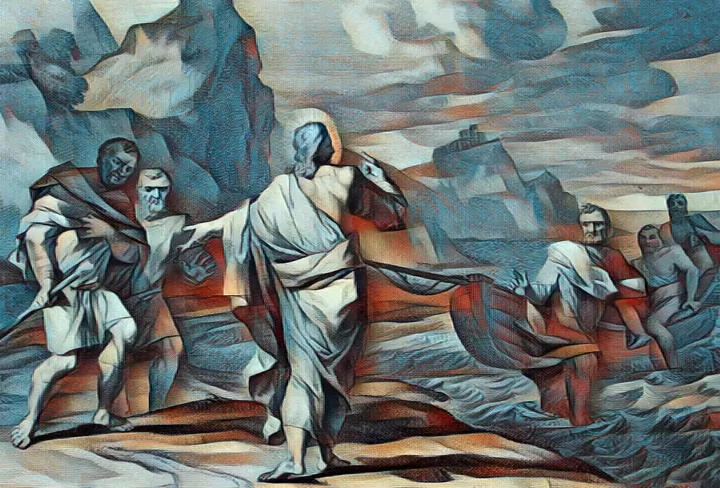
I was asked whether there is any connection between the condemnation of lust in Matthew 5:27-30 and what is said about marriage in Jeremiah 16. I suggested in the last post that the sayings in the Sermon on the Mount about being thrown into Gehenna are Jesus’ reworking of the prophet’s denunciation of Israel in Jeremiah 7. In brief, the men of Judah who enter the gates of the temple to worship YHWH “steal, murder, commit adultery, swear falsely, make offerings to Baal, and go after other gods that you have not known” (7:9); but the temple will be destroyed, and the bodies of the dead will be scattered in the valley of the Son of Hinnom, the Valley of Slaughter (7:14, 30-34; 19:7-8). Jesus condemns the men of Israel in more or less the same terms. Gehenna stands for the horror of the coming Roman assault on the city and the attendant loss of life.
You shall not take a wife…
Jeremiah 16 is part of this sustained rebuke of Israel. It begins:
The word of the LORD came to me: “You shall not take a wife, nor shall you have sons or daughters in this place. For thus says the LORD concerning the sons and daughters who are born in this place, and concerning the mothers who bore them and the fathers who fathered them in this land: They shall die of deadly diseases. They shall not be lamented, nor shall they be buried. They shall be as dung on the surface of the ground. They shall perish by the sword and by famine, and their dead bodies shall be food for the birds of the air and for the beasts of the earth.” (Jer. 16:1–4)
This clearly has the same prospect in view: the death of large numbers of Judeans as a consequence of the Babylonian invasion, which will bring disease, famine, and the sword. But the outcome is not directly linked to the sexual immorality of the people. Rather, Jeremiah is instructed not to get married and not to have sons and daughters of his own because there will be no hope for them. Any children born to him will suffer the same fate as all the children born in the land.
We have a powerful and very relevant analogy today in the many young people who do not want to bring children into a world that faces an imminent climate catastrophe. A survey published in The Lancet in 2021 found that 39% of 16 to 25 year olds globally are “hesitant to have children.” There are some standing here who will not taste death before….
If people ask Jeremiah why the Lord has pronounced all this evil against them, he is to say:
Because your fathers have forsaken me, declares the LORD, and have gone after other gods and have served and worshiped them, and have forsaken me and have not kept my law, and because you have done worse than your fathers, for behold, every one of you follows his stubborn, evil will, refusing to listen to me. (16:11–12)
Therefore, they will be driven from the land into exile, to serve other gods in Babylon.
So it appears that the argument about judgment runs right through this passage, but the theme of marriage is put to different use.
I will make you fishers of men
But if we read on, we come across this sentence, here in the Greek version; and I wonder whether this may not be another motif that is picked up by Jesus:
Behold, I send the many fishermen (haleeis), and they will fish for them, says the Lord; and after these things, I will send the many hunters, and they will hunt for them on every mountain and on every high place and from the holes of the rocks. (Jer. 16:16* LXX)
This is an image of judgment, not of salvation. YHWH sends the fishermen and hunters “because my eyes are on all their ways, and their unrighteous deeds were not hidden from before my eyes.” The people will not escape the judgment of God.
Jesus’ parable of the net (Matt. 13:47-50) does not directly echo the thought. The devastating judgment of Israel, which will be the centrepiece of the coming kingdom of God, will be like a net that is thrown into the sea, catching fish of every kind. The fishermen bring it ashore and sort out the good from the bad. And so it will be at the end of the age of second temple Judaism. “The angels will come out and separate the evil from the righteous and throw them into the fiery furnace.” The fiery furnace is the judgment of Gehenna, which is the horror of the siege of Jerusalem by the armies of Rome.
But perhaps, too, the call to the disciples to become “fishers of people” (halieis anthrōpōn) in Matthew 4:19 has a more sinister edge to it than we usually suppose. At least, it seems likely that the statement picks up the dire warning that the “kingdom of heaven is at hand” in verse 17, and anticipates the troubling parable of the net and the destruction of the bad fish. Many of those “caught” by these fishermen will suffer the judgment of Gehenna.
Thanks for posting this! I have been thinking about the fishing parables in connection with my work on John the Baptist and the “fishers for people” saying has an important place. I’d love to hear more, whether here or privately, on what you think the apostles were called to do in this scenario of catching people for judgment. Or was it simply that proclamation of the good news itself forced people to align themselves in ways that would lead to their imminent judgment or vindication?
Some more thoughts. Probably more the latter of your two options.



Recent comments